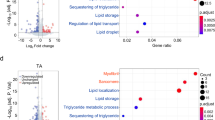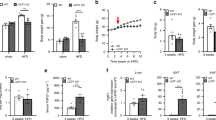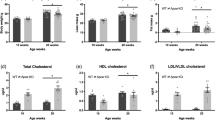Abstract
OBJECTIVE: To analyse the impact of vitamin A supplementation of both a normal fat (NF) diet and a high fat (HF) diet and of acute retinoic acid (RA)-treatment on the expression of uncoupling protein 3 (UCP3) in mice.
DESIGN: C57BL/6J mice were fed for 18 weeks a NF or a HF diet (10 and 45 energy% as fat, respectively), both with the normal vitamin A content or an excess vitamin A (8 mg and 320 mg retinyl palmitate/kg diet, respectively). Body weight and energy intake were recorded periodically. UCP3 mRNA and UCP3 protein levels in skeletal muscle (soleus/gastrocnemius) were analysed, as well as UCP1, UCP2 and UCP3 mRNA levels in interscapular brown adipose tissue (BAT), and UCP2 mRNA, UCP2 protein and leptin mRNA levels in white adipose tissue (WAT) depots. The effect of acute RA-treatment (100 mg/kg/day, 4 days) on UCP3 mRNA levels in skeletal muscle and BAT of NMRI mice was also assessed.
RESULTS: Vitamin A supplementation of a NF diet led to increased levels of UCP3 mRNA and UCP3 protein in muscle, UCP1 mRNA in BAT, and UCP2 mRNA in inguinal WAT, but had no impact on body weight or adiposity of B6 mice. HF diet promoted obesity and increased levels of UCP3 mRNA and UCP3 protein in skeletal muscle, and of the mRNAs for all three UCPs in BAT. Supplementing the HF diet with vitamin A had little effect on the final obesity reached and did not lead to further increases of muscle UCP3 mRNA nor BAT UCP1 mRNA over the levels achieved with the non-supplemented HF diet. Adipose leptin mRNA levels were down regulated after vitamin A supplementation, independently of the fat content of the diet. Up-regulation of muscle, but not BAT, UCP3 mRNA levels was also found after acute RA-treatment in NMRI mice.
CONCLUSION: The results provide evidence of a stimulatory effect of retinoids on muscle UCP3 expression in vivo, and a differential retinoid-regulation of the UCP3 gene in muscle and BAT.
This is a preview of subscription content, access via your institution
Access options
Subscribe to this journal
Receive 12 print issues and online access
$259.00 per year
only $21.58 per issue
Buy this article
- Purchase on Springer Link
- Instant access to full article PDF
Prices may be subject to local taxes which are calculated during checkout



Similar content being viewed by others

References
Ricquier D & Bouillaud F . The uncoupling protein homologues: UCP1, UCP2, UCP3, StUCP and AtUCP. Biochem J 2000; 345: 161–179.
Palou A, Picó C, Bonet ML & Oliver P . Molecules in Focus: the uncoupling protein, thermogenin. Int J Biochem Cell Biol 1998; 30: 7–11.
Vidal-Puig A, Grujic D, Zhang CY, Hagen T, Boss O, Ido Y, Szczepanik A, Wade J, Mootha V, Cortright R, Muoio DM & Lowell BB . Energy metabolism in uncoupling protein 3 gene knockout mice. J Biol Chem 2000; 275: 16258–16266.
Cline GW, Vidal-Puig AJ, Dufour S, Cadman KS, Lowell BB & Shulman GI . In vivo effects of uncoupling protein-3 gene disruption on mitochondrial energy metabolism. J Biol Chem 2001; 276: 20240–20244.
Cadenas S, Echtay KS, Harper JA, Jekabsons MB, Buckingham JA, Grau E, Abuin A, Chapman H, Clapham JC & Brand MD . The basal proton conductance of skeletal muscle mitochondria from transgenic mice overexpressing or lacking uncoupling protein-3. J Biol Chem 2002; 277: 2773–2778.
Zurlo F, Larson K, Bogardus C & Ravussin E . Skeletal muscle is a major determinant of resting energy expenditure. J Clin Invest 1990; 86: 1423–1427.
Enerbäck S, Jacobsson A, Simpson EM, Guerra C, Yamashita H, Harper ME & Kozak LP . Mice lacking mitochondrial uncoupling protein are cold-sensitive but not obese. Nature 1997; 387: 90–94.
Gong DW, Monemdjou S, Gavrilova O, Leon LR, Marcus-Samuels B, Chou CJ, Everett C, Kozak LP, Li C, Deng C, Harper ME & Reitman ML . Lack of obesity and normal response to fasting and thyroid hormone in mice lacking uncoupling protein-3. J Biol Chem 2000; 275: 16251–16257.
Arsenijevic D, Onuma H, Pecqueur C, Raimbault S, Manning BS, Miroux B, Couplan E, Alves-Guerra MC, Goubern M, Surwitt R, Bouillaud F, Richard D, Collins S & Ricquier D . Disruption of the uncoupling protein-2 gene in mice reveals a role in immunity and reactive oxygen species production. Nature Genet 2000; 26: 435–439.
Samec S, Seydoux J & Dulloo AG . Role of UCP homologues in skeletal muscles and brown adipose tissues: mediators of thermogenesis or regulators of lipids as fuel substrate. FASEB J 1998; 12: 715–724.
Skulachev VP . Uncoupling: new approaches to an old problem of bioenergetics. Biochim Biophys Acta 1998; 1363: 100–124.
Palou A, Serra F, Bonet ML & Picó C . Obesity: molecular bases of a multifactorial problem. Eur J Nutr 2000; 39: 127–144.
Fleury C, Neverova M, Collins S, Raimbault S, Champigny O, Levy-Meyrueis C, Bouillaud F, Seldin MF, Surwit RS, Ricquier D & Warden CH . Uncoupling protein-2: a novel gene linked to obesity and hyperinsulinemia. Nature Genet 1997; 15: 269–272.
Roca P, Rodríguez AM, Oliver P, Bonet ML, Quevedo S, Pico C & Palou A . Brown adipose tissue response to cafeteria diet-feeding involves induction of the UCP2 gene and is impaired in female rats as compared to males. Pflügers Arch Eur J Physiol 1999; 438: 628–634.
Gong DW, He Y & Reitman ML . Genomic organization and regulation by dietary fat of the uncoupling protein 3 and 2 genes. Biochem Biophys Res Commun 1999; 256: 27–32.
Surwit RS, Wang S, Petro AE, Sanchis D, Raimbault S, Ricquier D & Collins S . Diet-induced changes in uncoupling proteins in obesity-prone and obesity-resistant strains of mice. Proc Natl Acad Sci USA 1998; 95: 4061–4065.
Matsuda J, Hosoda K, Itoh H, Son C, Doi K, Tanaka T, Fukunaga Y, Inoue G, Nishimura H, Yoshimasa Y, Yamori Y & Nakao K . Cloning of rat uncoupling protein-3 and uncoupling protein-2 cDNAs: their gene expression in rats fed high-fat diet. FEBS Lett 1997; 418: 200–204.
Sadurskis A, Dicker A, Cannon B & Nedergaard J . Polyunsaturated fatty acids recruit brown adipose tissue: increased UCP content and NST capacity. Am J Physiol 1995; 269: E351–E360.
Rodriguez VM, Portillo MP, Picó C, Macarulla MT & Palou A . Olive oil feeding up-regulates uncoupling protein genes in rat brown adipose tissue and skeletal muscle. Am J Clin Nutr 2002; 75: 213–220.
Portillo MP, Serra F, Simon E, del Barrio AS & Palou A . Energy restriction with hig-fat diet enriched with coconut oil gives higher UCP1 and lower white fat in rats. Int J Obes Relat Metab Disord 1998; 22: 974–979.
Álvarez R, De Andrés J, Yubero P, Viñas O, Mampel T, Iglesias R, Giralt M & Villarroya F . A novel regulatory pathway of brown fat thermogenesis. Retinoic acid is a transcriptional activator of the mitochondrial uncoupling protein gene. J Biol Chem 1995; 270: 5666–5673.
Puigserver P, Vázquez F, Bonet ML, Picó C & Palou A . In vitro and in vivo induction of the brown adipocyte uncoupling protein thermogenin by retinoic acid. Biochem J 1996; 317: 827–833.
Carmona MC, Valmaseda A, Iglesias R, Mampel T, Vinas O, Giralt M & Villarroya F . 9-cis retinoic acid induces the expression of the uncoupling protein-2 gene in brown adipocytes. FEBS Lett 1998; 441: 447–450.
Nagase I, Yoshida S, Canas X, Irie Y, Kimura K, Yoshida T & Saito M . Up-regulation of uncoupling protein 3 by thyroid hormone, peroxisome proliferator-activated receptor ligands and 9-cis-retinoic acid in L6 myotubes. FEBS Lett 1999; 461: 319–322.
Solanes G, Pedraza N, Iglesias R, Giralt M & Villarroya F . The human uncoupling protein-3 gene promoter requires MyoD and is induced by retinoic acid in muscle cells. FASEB J 2000; 14: 2141–2143.
Serra F, Bonet ML, Puigserver P, Oliver J & Palou A . Stimulation of uncoupling protein 1 expression in brown adipocytes by naturally occurring carotenoids. Int J Obes Relat Metab Disord 1999; 23: 650–655.
Kumar MV & Scarpace PJ . Differential effects of retinoic acid on uncoupling protein-1 and leptin gene expression. J Endocrinol 1998; 157: 237–243.
Bonet ML, Oliver J, Picó C, Felipe F, Ribot J, Cinti S & Palou A . Opposite effects of vitamin A deficient diet-feeding and retinoic acid treatment on brown adipose tissue UCP1, UCP2 and leptin expression. J Endocrinol 2000; 166: 511–517.
Ribot J, Felipe F, Bonet ML & Palou A . Changes of adiposity in response to vitamin A status correlate with changes of PPARγ2 expression. Obes Res 2001; 9: 500–509.
Kumar MV, Sunvold GD & Scarpace PJ . Dietary vitamin A supplementation in rats: suppression of leptin and induction of UCP1 mRNA. J Lipid Res 1999; 40: 824–829.
Trayhurn P, Duncan JS, Nestor A, Thomas ME & Rayner DV . Chemiluminiscent detection of mRNAs on northern blots with digoxigenin end-labeled oligonuclotides. Anal Biochem 1994; 222: 224–230.
Trayhurn P, Duncan JS & Rayner . Acute cold-induced supression of ob (obese) gene expression in white adipose tissue of mice: mediation by the sympathetic system. Biochem J 1995; 311: 729–733.
Bradford MM . A rapid and sensitive method for the quantitation of microgram quantities of protein utilizing the principle of protein-dye binding. Anal Biochem 1976; 72: 248–254.
Laemmli UK . Cleavage of structural proteins during the assembly of the head of bacteriophage T4. Nature 1970; 72: 248–254.
Sivitz WI, Fink BD & Donohoue PA . Fasting and leptin modulate adipose and muscle uncoupling protein: divergent effects between messenger ribonucleic acid and protein expression. Endocrinology 1999; 140: 1511–1519.
Folch J, Lees N & Sloane JH . A simple method for the isolation and purification of total lipids from animal tissues. J Biol Chem 1957; 266: 497–509.
West DB, Boozer CN, Moody DL & Atkinson RL . Dietary obesity in nine inbred mouse strains. Am J Physiol 1992; 262: R1025–1032.
Rebuffe-Scrive M, Surwit R, Feinglos M, Kuhn C & Rodin J . Regional fat distribution and metabolism in a new mouse model (C57BL/6J) of non-insulin-dependent diabetes mellitus. Metabolism 1993; 42: 1405–1409.
Acín A, Rodriguez M, Rique H, Canet E, Boutin JA & Galizzi JP . Cloning and characterization of the 5′ flanking region of the human uncoupling protein 3 (UCP3) gene. Biochem Biophys Res Commun 1999; 258: 278–283.
Chambon P . A decade of molecular biology of retinoic acid receptors. FASEB J 1996; 10: 940–954.
Desvergne B & Wahli W . Peroxisome proliferator-activated receptors: nuclear control of metabolism. Endocrine Rev 1999; 20: 649–688.
Gong DW, He Y, Karas M & Reitman M . Uncoupling protein-3 is a mediator of thermogenesis regulated by thyroid hormone, β3-adrenergic agonists, and leptin. J Biol Chem 1997; 272: 24129–24132.
Dolle P, Fraulob V, Kastner P & Chambon P . Developmental expression of murine retinoid X receptor (RXR) genes. Mech Dev 1994; 45: 91–104.
Jezek P, Engstova H, Zackova M, Vercesi AE, Costa AD, Arruda P & Garlid KD . Fatty acid cycling mechanism and mitochondrial uncoupling proteins. Biochim Biophys Acta 1998; 1365: 319–327.
Himms-Hagen J & Harper ME . Physiological role of UCP3 may be export of fatty acids from mitochondria when fatty acid oxidation predominates: an hypothesis. Exp Biol Med 2001; 226: 78–84.
Schrauwen O, Saris W & Hesselink MK . An alternative function for human uncoupling protein 3: protection of mitochondria against accumulation of nonesterified fatty acids inside the mitochondrial matrix. FASEB J 2001; 15: 2497–2502.
Schrauwen P, Hoppeler H, Billeter R, Bakker AHF & Pendergast DR . Fiber type dependent upregulation of human skeletal muscle UCP2 and UCP3 mRNA expression by high-fat diet. Int J Obes Relat Metab Disord 2001; 25: 449–456.
Surwit RS, Kuhn CM, Cochrane C, McCubbin JA & Feinglos MN . Diet-induced type II diabetes in C57BL/6J mice. Diabetes 1988; 37: 1163–1167.
Weigle DS, Selfridge LE, Scharzt MW, Seeley RJ, Cummings DE, Havel PJ, Kuijper JL & BertrandelRio H . Elevated free fatty acids induce uncoupling protein 3 expression in muscle: a potential explanation for the effect of fasting. Diabetes 1998; 47: 298–302.
Boss O, Bobbioni-Harsch E, Assimacopoulos-Jeannet F, Muzzin P, Munger R, Giacobino JP & Golav A . Uncoupling protein-3 expression in skeletal muscle and free fatty acids in obesity. Lancet 1998; 351: 1933
Schrauwen P, Van Marken Lichtenbelt WD, Saris WH & Westerterp KR . Changes in fat oxidation in response to a high-fat diet. Am J Clin Nutr 1997; 66: 276–282.
Acknowledgements
This work was supported by the Spanish Government (Dirección General de Investigación, BFI2000-0988-C06-01, and Ministerio de Sanidad y Consumo, FIS 01/1379) and the European Union (COST Action 918, and QLRT-2001-00183 2000/C324). FF was the recipient of a doctoral fellowship from the Spanish Government (Ministerio de Educación, Cultura y Deportes).
Author information
Authors and Affiliations
Corresponding author
Rights and permissions
About this article
Cite this article
Felipe, F., Bonet, M., Ribot, J. et al. Up-regulation of muscle uncoupling protein 3 gene expression in mice following high fat diet, dietary vitamin A supplementation and acute retinoic acid-treatment. Int J Obes 27, 60–69 (2003). https://doi.org/10.1038/sj.ijo.0802188
Received:
Revised:
Accepted:
Published:
Issue Date:
DOI: https://doi.org/10.1038/sj.ijo.0802188
Keywords
This article is cited by
-
Vitamin A supplementation in early life affects later response to an obesogenic diet in rats
International Journal of Obesity (2013)
-
Serum Levels and Liver Store of Retinol and Their Association with Night Blindness in Individuals with Class III Obesity
Obesity Surgery (2012)
-
Retinol and α-Tocopherol in Morbid Obesity and Nonalcoholic Fatty Liver Disease
Obesity Surgery (2010)
-
β-Carotene conversion products and their effects on adipose tissue
Genes & Nutrition (2009)
-
Retinoic Acid Treatment Increases Lipid Oxidation Capacity in Skeletal Muscle of Mice
Obesity (2008)


